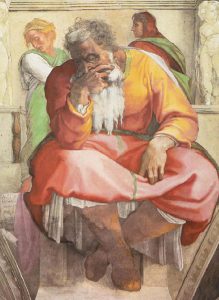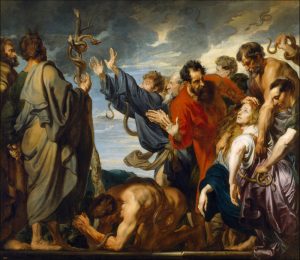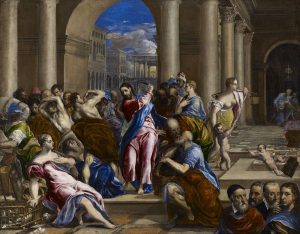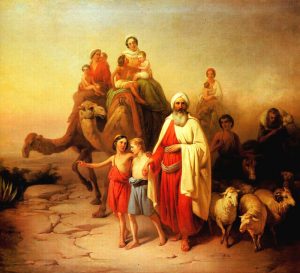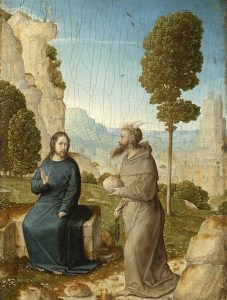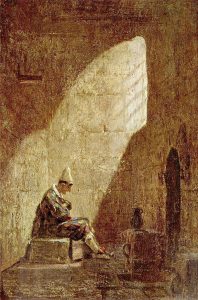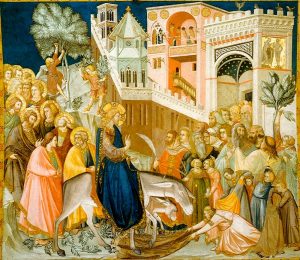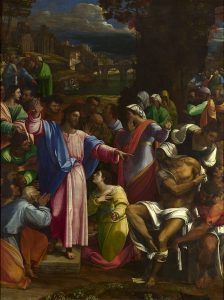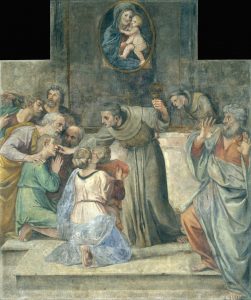Thoughts on Sunday’s Lessons for March 24, 2024 (Palm / Passion Sunday B)
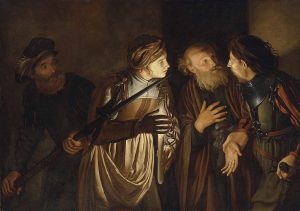
The Denial of Saint Peter (c.1607-1643), oil painting on canvas by Adam de Coster (c,1586-1643). Whitfield Fine Art, London. (Click image to enlarge.)
Liturgy of the Palms B
Gospel: Mark 11:1-11
Palm Sunday and Passion Sunday were once celebrated on separate Sundays, but the celebrations were combined in the time of ecumenism that followed Vatican II. As a result, we take a quick and startling turn in the course of Sunday’s worship. First we hear of Jesus’ triumphal entry into Jerusalem, riding a donkey and greeted as a king by throngs spreading their cloaks and leafy branches in his way, shouting “Hosanna!” And then, just a little later in the liturgy, we are yanked through a shocking reversal as those same crowds angrily shout “Crucify him!” This contrast sets a tone for Holy Week as we follow Jesus to the cross: God is always with us, in joy and in sorrow.
Alternate Palm Sunday Gospel: John 12:12-16
All four Gospels tell of Jesus’ triumphant entry into Jerusalem, riding a modest mount and hearing the acclaim of crowds. But each Gospel tells a slightly different story. John’s version, for example, is the only one that explicitly declares Jesus the King of Israel, and the only one that tells us the disciples did not understand what was going on. But all four versions share the image of crowds triumphantly waving branches – in John’s version, explicitly described as palms – and the crowd’s joyous shouts of “Hosanna!”
Psalm: Psalm 118:1-2, 19-29
On Palm Sunday as we chant this ancient hymn of celebration and praise – traditionally titled “A Song of Victory” – imagine a joyous crowd approaching the Temple, clapping hands and singing in celebration of the Lord their God, whose steadfast love endures forever. Its words of joyous praise for God’s works and God’s mercy foreshadow the words we sing in the Great Thanksgiving as our Eucharistic Prayer begins: “Blessed is the one who comes in the name of the Lord! … Hosanna in the highest.”
Liturgy of the Passion B
First Reading: Isaiah 50:4-9a
These familiar verses from Isaiah introduce us to the prophet’s familiar vision of the Suffering Servant. These evocative verses prophesy a servant leader who who would receive the enemy’s blows on behalf of the people in exile, and who would eventually guide them back home to Jerusalem. We must respect the original intent, but it is hard for Christian readers to ponder these verses without imagining parallels with Jesus, our messiah and king, who also suffered for us and taught us to give our backs and turn our cheeks to those who strike us.
Psalm: Psalm 31:9-16
Perhaps the Psalmist had Isaiah’s Suffering Servant in mind in framing this Psalm of lament, with its litany of sorrow, distress, grief, sighing, misery, scorn, horror, and dread. The speaker suffers. His neighbors scheme. They plot his death. It is hard to imagine a thought more pitiful than “I am as useless as a broken pot.” Yet amid all this misery, hope glows like the sun breaking through clouds: Trust in God, place our faith in God’s love, and wait to be saved.
Second Reading: Philippians 2:5-11
We might imagine parallels with the Suffering Servant in Paul’s writing, too, as he tells here of Jesus’s death on the cross. We accept Jesus as both fully human and fully divine, and all the Gospels show us glimpses of a Jesus who knew his stature and God-sent mission. Yet Paul, possibly quoting a very early Christian hymn, speaks poetically of a Jesus who willingly set aside his divinity, his equality with God – “emptying himself” – to bear the horrific pain of crucifixion as a vulnerable, frightened human. Jesus took on the full weight of all that suffering to show us the true exaltation of God’s love, calling us only to respond with love for God and our neighbor.
Gospel: Mark 14:1-15:47
Finally we come to Mark’s account of Jesus’ passion and death. The palm branches and hosannas are only memories now. We hear the dark, painful way of the Cross as we prepare to walk through Holy Week with Jesus. Watch closely as we see first Jesus’ followers, and then even his friends, slip quietly away, deserting him, leaving at the end only those few most close to him, and a Roman centurion – a pagan, a soldier of the hated empire – whose faith showed him the light and thus opens the way to us all.

